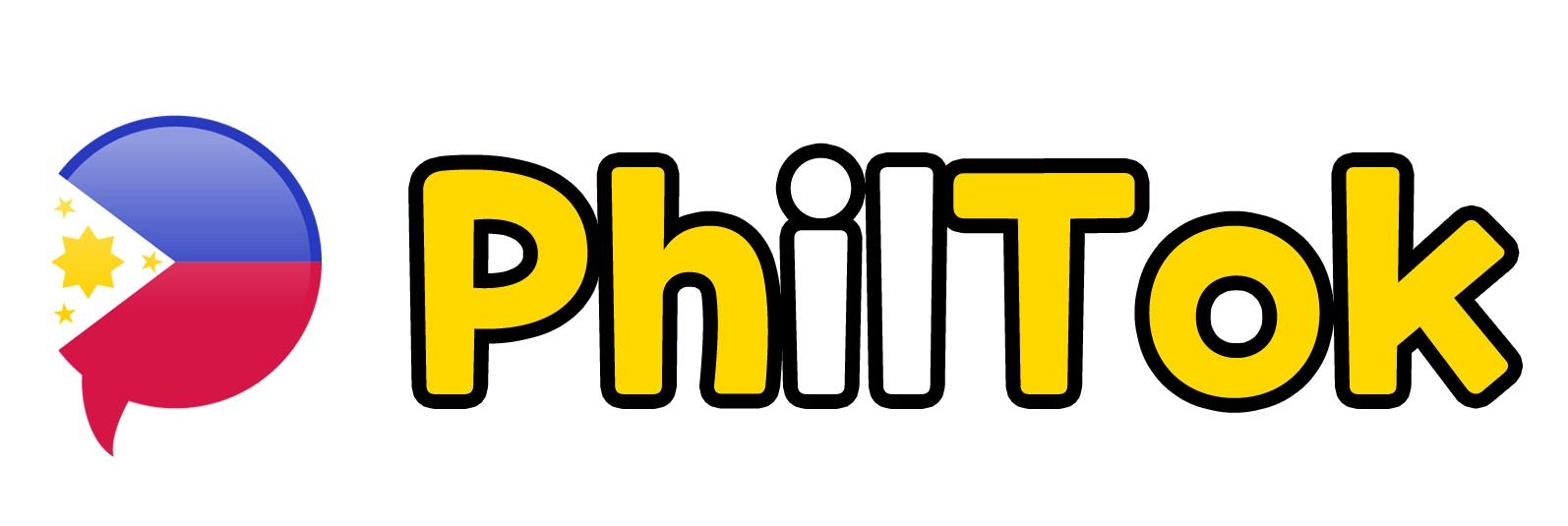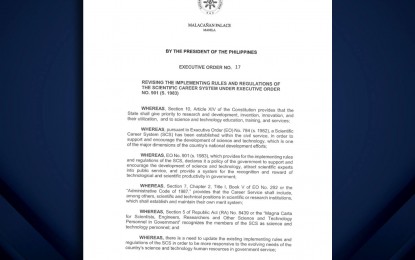[2.22] Marcos, 과학 경력 시스템의 IRR 수정 EO 발행
컨텐츠 정보
- 22,369 조회
본문
MANILA – "Ferdinand R. Marcos Jr." 회장 이전 대통령 명령에 따라 과학 경력 시스템(SCS)의 시행 규칙 및 규정(IRR)을 개정하는 행정 명령(EO)을 발표했습니다.
SCS는 우수한 자격을 갖춘 생산적인 과학 인력 풀을 개발하기 위한 수단으로 공공 서비스 과학자의 채용, 경력 발전, 인정 및 보상 시스템입니다.
2월 20일 "Marcos"가 서명한 EO 17에 따라 그는 "정부 서비스에서 국가의 과학 기술 인적 자원의 진화하는 요구에" 효과적으로 대응하기 위해 IRR을 업데이트해야 할 필요성을 강조했습니다.
EO는 SCS가 "자격, 공로 및 과학적 생산성, 과학자에 대한 경력 경로를 기반으로 한 진입 및 경력 발전 또는 발전, 그리고 우수한 자격을 갖춘 인력의 유치 및 유지를 보장하기 위한 인센티브 및 보상으로 특징지어질 것"이라고 말합니다. 과학 기술 분야.”
그것은 생물 과학, 공학 및 기술, 수리 및 물리 과학, 건강 및 농업 과학뿐만 아니라 과학에 의해 결정된 모든 과학 분야를 다루는 연구 및 개발에 직접 관여하는 과학 석사 및 박사 학위를 가진 과학 인력에게 적용됩니다. 경력 위원회(SCC).
SCS의 관리 시스템은 당연직 의장인 CSC 의장, 당연직 공동 의장인 과학기술부(DOST) 간사 및 기타 당연직 위원으로 구성됩니다.
SCC는 자문 기관 및 심사 위원회 역할을 하는 기술 실무 그룹 및 특별 기술 위원회(STC)를 구성합니다.
서로 다른 전문 분야의 STC는 해당 분야의 당국에서 인정하고 2년 동안 봉사할 최소 5명의 위원으로 구성된 각 기술 위원회와 함께 만들어집니다.
EO 17은 SCS에서 과학자의 임명이 과학자 1에서 과학자 5까지의 순위에 따라 이루어지며 최소 자격을 충족하는 범위 내에서 시스템에 허용될 것이라고 명시합니다.
이들의 급여는 보상 계획을 기반으로 하며, 여기에는 CES(Career Executive Service)에 상응하는 추가 혜택 및 합리적인 수당이 포함됩니다.
보상 계획에 따라 과학자 1은 급여 등급 26, 과학자 2는 급여 등급 27, 과학자 3은 급여 등급 28, 과학자 4는 급여 등급 29, 과학자 5는 급여 등급 30입니다. .
EO 17은 또한 활동 중인 모든 과학자를 위한 지속적인 교육 프로그램을 제공할 것을 요구합니다.
SCS 사무국은 일반 세출법(General Appropriations Act)에 의해 자금을 지원받으며, 중앙 정부 기관, 주립 대학 및 단과대학의 과학자들은 각자의 세출을 통해 보상을 받습니다.
정부 소유 또는 관리 기업(GOCC)의 과학자는 해당 기업 운영 예산을 통해 보상을 받는 반면, 지방 정부 단위의 경우 급여는 RA No. 7160 또는 지방 정부에 따라 해당 지역 기금에서 청구됩니다. 1991년 코드.
SCS의 IRR을 제공하는 EO No. 901은 "과학 및 기술의 발전을 지원 및 장려하고, 과학 전문가를 공공 서비스로 유치하고, 정부의 기술 및 과학 생산성.”
1987년 헌법은 국가가 연구 개발, 발명, 혁신 및 활용과 과학 기술 교육, 훈련 및 서비스에 우선권을 부여해야 한다고 규정하고 있습니다. (PNA)
This is the Original Article from PNA NEWS
[2.22] Marcos issues EO revising IRR of scientific career system
MANILA – President "Ferdinand R. Marcos Jr." has issued an executive order (EO) revising the implementing rules and regulations (IRR) of the scientific career system (SCS) under a previous presidential order.
The SCS is a system of recruitment, career progression, recognition and reward of scientists in the public service, as a means of developing a pool of highly qualified and productive scientific personnel.
Under EO 17, signed by "Marcos" on Feb. 20, he underscored the need to update the IRR to effectively respond “to the evolving needs of the country’s science and technology human resources in government service.”
The EO states that the SCS will be characterized by “the entrance to and a career progression or advancement based on qualifications, merit and scientific productivity, career path to scientists, as well as incentives and rewards to ensure attraction and retention of highly qualified personnel in the science and technology sector.”
It will apply to scientific personnel with master’s and doctorate degrees in sciences who are directly involved in research and development, covering biological sciences, engineering and technology, mathematical and physical sciences, health and agricultural sciences, as well as all scientific disciplines determined by the Scientific Career Council (SCC).
The SCS’s administration system will be composed of the chairperson of the CSC as ex-officio chairperson, the secretary of the Department of Science and Technology (DOST) as ex-officio co-chairperson and other ex-officio members.
A Technical Working Group and Special Technical Committees (STCs) will be established by the SCC to serve as an advisory body and screening committee.
STCs in different fields of specialization will be created with each technical committee composed of at least five members recognized by authorities in their respective fields and who will serve for two years.
EO 17 states that the appointments of scientists under SCS will be based on rank, from Scientist 1 to Scientist 5, who will be admitted to the system to the extent that they meet the minimum qualifications.
Their pay will be based on a compensation plan, which will include fringe benefits and reasonable allowances comparable to those of the Career Executive Service (CES).
Based on the compensation plan, Scientist 1 will have a salary grade 26, Scientist 2 will have a salary grade 27, Scientist 3 will have a salary grade 28, Scientist 4 will have a salary grade 29 and Scientist 5 will have a salary grade 30.
EO 17 also calls for the provision of a continuing training program for all active scientists.
The SCS secretariat will be funded by the General Appropriations Act, while scientists from national government agencies, state universities and colleges will be compensated through their respective appropriations.
Scientists from government-owned or controlled corporations (GOCCs) will be compensated through their respective corporate operating budgets, while for those from local government units, their salaries will be charged against their respective local funds in accordance with RA No. 7160 or the Local Government Code of 1991.
EO No. 901, which provides for the IRR of the SCS, declares it a policy of the government "to support and encourage the development of science and technology, attract scientific experts into public service, and provide a system for the recognition and reward of technological and scientific productivity in government.”
The 1987 Constitution provides that the state must give priority to research and development, invention, innovation and their utilization, and to science and technology education, training and services. (PNA)
관련자료
-
이전
-
다음


